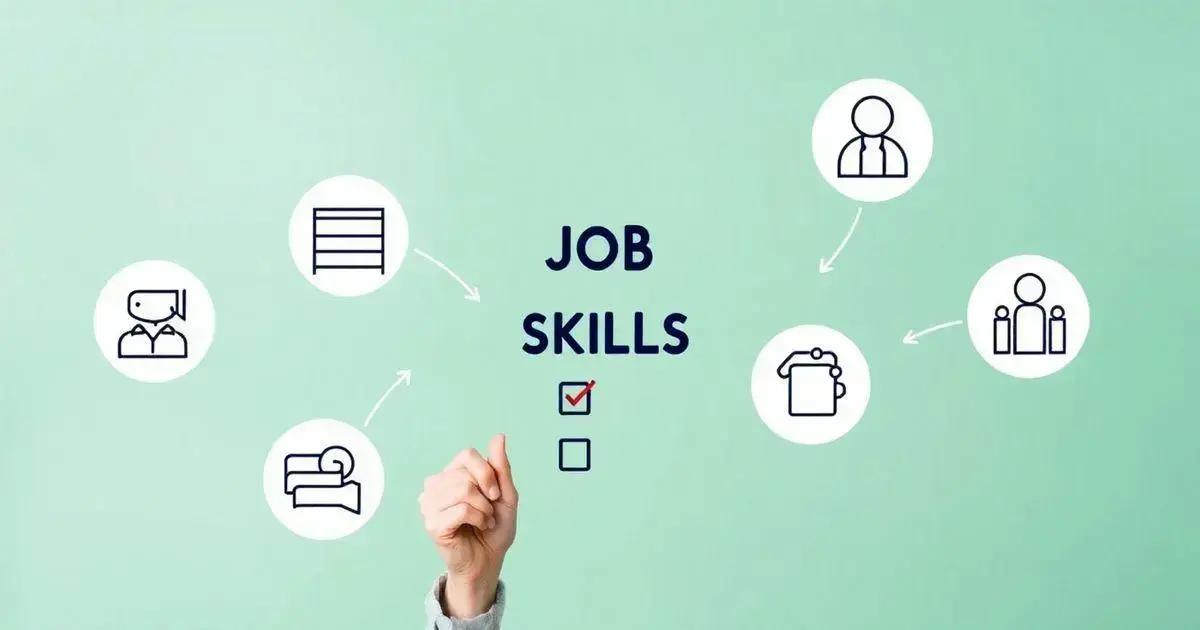Career advice for job seekers is crucial in today’s fast-changing job market. With new opportunities arising every day, it’s essential to know how to stand out and find the right path to success. Whether you’re a recent graduate or an experienced professional, these insights will help guide your job search.
Navigating the job market requires understanding trends, networking, and knowing what skills employers seek. Many candidates overlook the importance of adapting to market shifts and the hidden opportunities that come with them. By staying informed, you can gain a competitive edge.
Ready to take your job search to the next level? Keep reading to discover actionable tips that will boost your chances of landing the job you want!
Understanding the Job Market
Career advice for job seekers emphasizes the importance of staying up-to-date with market shifts and adapting to new opportunities.
Current Job Market Trends
The job market has shifted significantly in recent years. Remote work has become more commonplace, leading to greater flexibility for job seekers. Understanding which roles are in demand, such as technology and healthcare positions, can help focus your job search on industries with growth potential.
Identifying Opportunities
Many job seekers overlook opportunities that may not be widely advertised. Companies often fill roles through referrals or internal promotions. Networking and building relationships within your desired industry can unveil these hidden opportunities.
Researching Industries
Conducting thorough research on your targeted industry is vital. Look at salary expectations, required skills, and potential career paths. This information can help tailor your resume and prepare for interviews. Use resources like industry reports and labor statistics to gather relevant data.
The Role of Networking
Networking is crucial in understanding the job market. Attending industry events, joining professional organizations, and connecting with others on platforms like LinkedIn can provide insights about job openings and trends. Conversations can lead to valuable information you won’t find in a job posting.
Using Job Boards Effectively
Job boards are a popular tool for job seekers, but knowing how to use them can enhance their effectiveness. Filter your search based on location, industry, and job type. Set up alerts for new job postings to ensure you are among the first to apply.
Adapting to Market Changes
The job market is continuously evolving. Be prepared to adapt your strategies as required. Career advice for job seekers often includes tips on upskilling or reskilling to match the current demands of employers. Online courses, certifications, and workshops can help you stay competitive.
Key Skills Job Seekers Need

In today’s job market, key skills job seekers need are more important than ever. Employers look for candidates who can adapt and thrive in various environments. Here are some essential skills that will make you stand out.
1. Communication Skills
Effective communication is critical in any job. This includes both speaking and writing. Being able to convey your ideas clearly and concisely makes you a valuable team member. Practice active listening to understand others better.
2. Problem-Solving Skills
Employers seek individuals who can think critically and solve problems independently. Being able to analyze situations, identify issues, and come up with effective solutions is highly appreciated in the workplace.
3. Adaptability
The job market is ever-changing. Candidates must be adaptable to new situations, technologies, and methods. Showcase your willingness to learn and adjust when applying for jobs.
4. Teamwork and Collaboration
Most jobs require you to work with others. Demonstrating your ability to collaborate with diverse teams can set you apart. Highlight experiences where teamwork led to success.
5. Time Management
Being able to manage your time effectively is vital. Employers want to know you can prioritize tasks and meet deadlines without compromising quality. Discuss how you plan your day and handle multiple responsibilities.
6. Technical Proficiency
In today’s digital world, having technical skills is essential. This could include proficiency in software, tools, or platforms relevant to your industry. Stay updated on technological trends to enhance your skill set.
7. Leadership Qualities
Even if you’re not in a management role, having leadership qualities can be beneficial. Show your ability to motivate others and take initiative. This can be a great asset in collaborative projects.
8. Emotional Intelligence
Understanding and managing emotions, both yours and others’, is an important skill. Emotional intelligence helps in better teamwork, communication, and conflict resolution, making you a more effective employee.
9. Continuous Learning
Employers appreciate candidates who are committed to personal and professional growth. Show your enthusiasm for learning new skills or gaining knowledge through courses, workshops, or networking.
Career advice for job seekers emphasizes that these key skills not only enhance your ability to perform effectively but also help you build a reputation as a versatile and dependable candidate.
Mastering these skills and demonstrating them during the hiring process can set you apart from other applicants. Career advice for job seekers often highlights the importance of continuous improvement and staying ahead of industry trends.
How to Build an Effective Resume
How to build an effective resume is vital for job seekers aiming to land their dream job. A well-structured resume can help showcase your strengths and skills. Here are essential tips to create an impressive resume.
1. Choose the Right Format
Select a resume format that suits your experience. The most common formats are chronological, functional, and combination. A chronological resume highlights your work history, while a functional resume focuses on skills. A combination format merges both to showcase your strengths effectively.
2. Write a Clear Objective
Your objective should reflect your career goals and the value you can bring to the employer. Make it concise and relevant to the job you are applying for. This sets a positive tone for the rest of your resume.
3. Highlight Relevant Skills
List key skills that match the job description. Use specific terms that relate to the position. This helps your resume pass through applicant tracking systems (ATS) that many companies use.
4. Showcase Work Experience
Include your work experience in reverse chronological order. Focus on achievements and responsibilities that demonstrate your skills. Use action verbs like “developed,” “managed,” or “created” to convey your contributions effectively.
5. Incorporate Education and Certifications
List your educational background, including degrees, schools attended, and graduation dates. Also, mention any relevant certifications that may enhance your qualifications for the job.
6. Use Numbers and Data
Quantifying your achievements can make a strong impact. For example, say you “increased sales by 20%” rather than simply stating you were responsible for sales. This provides concrete evidence of your success.
7. Keep it Error-Free
Proofread your resume to eliminate any spelling or grammatical errors. Mistakes can make you appear careless. Consider asking a friend or using online tools to check for errors.
8. Tailor Each Resume
Customize your resume for each job application. Highlight relevant skills and experiences that align with the job description. Tailoring your resume increases your chances of catching the attention of hiring managers.
9. Use Appropriate Design
A clean and professional design helps your resume stand out. Use readable fonts and a structured layout. Avoid overly complicated designs that may distract from the content.
Career advice for job seekers emphasizes that building a resume that reflects your strengths and is tailored to each job application can greatly improve your chances of success.
By following these tips and integrating career advice for job seekers, you can create a resume that impresses hiring managers and boosts your job prospects.
Mastering the Art of Interviews

Mastering the art of interviews is essential for job seekers aiming to impress potential employers. Interviews can be nerve-wracking, but preparation can help you shine. Here are some effective strategies to excel.
1. Research the Company
Before the interview, learn about the company’s mission, values, and culture. Familiarize yourself with their products or services. This knowledge shows your genuine interest and allows you to tailor your answers to the company’s needs.
2. Practice Common Interview Questions
Anticipate frequently asked questions like “Tell me about yourself” or “What are your strengths and weaknesses?” Prepare clear and concise answers, and practice them aloud to build confidence.
3. Prepare Your Own Questions
At the end of the interview, you’ll likely be asked if you have any questions. Prepare thoughtful questions that demonstrate your interest in the role and the company. For example, ask about the team dynamics or opportunities for professional development.
4. Dress Appropriately
Your appearance matters. Dress professionally according to the company culture. When in doubt, opt for business attire. This shows respect and helps you feel more confident.
5. Practice Good Body Language
Non-verbal communication plays a vital role in interviews. Maintain eye contact, offer a firm handshake, and sit up straight. These actions convey confidence and engagement.
6. Manage Your Nerves
It’s normal to feel nervous before an interview. Take deep breaths and practice relaxation techniques. Remember, the interview is a two-way street, and you are also assessing whether the company is a good fit for you.
7. Follow-Up After the Interview
After the interview, send a thank-you email within 24 hours. Express gratitude for the opportunity to interview, and reiterate your interest in the position. This helps you stand out and shows professionalism.
8. Reflect and Learn
After each interview, take time to reflect on your performance. Identify areas for improvement and celebrate what you did well. Continuous learning will enhance your interview skills over time.
To excel in the interview process, follow career advice for job seekers that emphasizes preparation, practice, and confidence. This will set you apart from other candidates and increase your chances of success.
Networking for Career Success
Networking for career success is a vital part of job searching. Building relationships can open doors and create opportunities you might not find otherwise. Here are effective strategies to enhance your networking skills.
1. Attend Industry Events
Participate in conferences, workshops, and seminars related to your field. These events are perfect for meeting new people and learning about industry trends.
2. Utilize Social Media
Platforms like LinkedIn are invaluable for networking. Create a professional profile, connect with industry leaders, and engage in relevant discussions. Share insightful articles and personal achievements to showcase your expertise.
3. Join Professional Organizations
Become a member of professional organizations in your field. These groups often provide networking opportunities, resources, and events tailored to your career goals.
4. Volunteer Your Time
Volunteering for projects or organizations related to your industry can help you meet professionals who share your interests. It shows your commitment and allows you to build relationships while giving back to the community.
5. Reach Out to Alumni
Connect with alumni from your school who work in your desired field. Alumni networks can offer valuable advice, referrals, and job opportunities that may not be publicly listed.
6. Schedule Informational Interviews
Request informational interviews with professionals in your field. This gives you a chance to learn more about their career path and industry insights while also expanding your network.
7. Follow Up
After meeting someone, always follow up with a thank-you email. Personalize your message by mentioning something specific from your conversation. This helps keep the connection alive.
8. Be Genuine
When networking, aim to build authentic relationships rather than just collecting contact information. Show genuine interest in others and their work, which can lead to stronger connections.
9. Offer Help
Networking is a two-way street. Look for ways to help others in your network. This could be offering advice or connecting them with someone in your circle. Being helpful can strengthen your relationships.
Utilizing LinkedIn for Job Searching

Utilizing LinkedIn for job searching is a powerful way to connect with employers and showcase your skills. LinkedIn is the largest professional networking site and can significantly enhance your job search efforts. Here are key strategies to make the most of LinkedIn.
1. Optimize Your Profile
Your LinkedIn profile should clearly represent your professional brand. Use a professional photo, write a strong headline, and create a compelling summary that highlights your skills and experiences.
2. Use Keywords
Incorporate industry-related keywords in your profile and job descriptions. This helps recruiters find you more easily when searching for potential candidates. Career advice for job seekers often emphasizes the importance of using the right keywords to stand out in search results.
3. Build Connections
Connect with colleagues, classmates, and industry professionals. Aim for a diverse network to increase your reach. Personalize connection requests to make a positive impression.
4. Join Groups
Participate in relevant LinkedIn groups to engage with professionals in your field. This is a great way to learn and network simultaneously. Share your insights and contribute to discussions.
5. Follow Companies
Follow companies you are interested in. This allows you to stay updated on job openings and company news. Engage with their posts to show your interest.
6. Share Content
Post articles, share updates, or write your own posts related to your industry. Sharing valuable content establishes you as a thought leader and keeps you visible to your network.
7. Use the Job Search Feature
Take advantage of LinkedIn’s job search function. You can filter job listings by location, industry, and experience level. Set up job alerts to receive notifications about new opportunities.
8. Request Recommendations
Ask colleagues or supervisors for recommendations. Testimonials from others can strengthen your profile and increase your credibility with potential employers.
9. Network with Recruiters
Connect with recruiters in your field. They often have access to job openings and can provide valuable information about the hiring process. By following career advice for job seekers, you’ll maximize your networking potential on LinkedIn and increase your chances of landing the perfect job.
Career Advice for Job Seekers: Final Considerations
Career advancement requires a proactive approach to continuous learning and strategic planning. By setting clear goals, seeking feedback, building a strong personal brand, and expanding your network, you can significantly enhance your professional growth.
Career advice for job seekers often emphasizes the importance of these actions to stand out and succeed in today’s competitive landscape.
Utilizing platforms like LinkedIn and investing in professional development are essential steps in today’s job market. Embrace the importance of lifelong learning as it prepares you to adapt to changes and capitalize on new opportunities.
Additionally, staying open to new experiences and maintaining a positive attitude at work are crucial elements to achieving success. By applying these strategies effectively, you can not only navigate your current job market but also unlock the pathway to a fulfilling and successful career.
Career advice for job seekers consistently highlights the value of adaptability and resilience in achieving long-term career goals.




